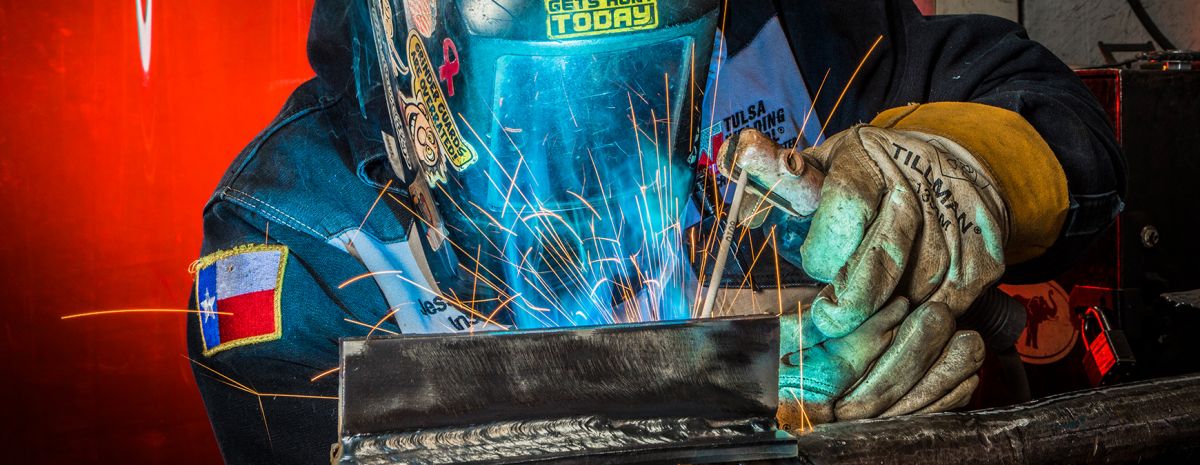RSI is a Great Training Option for Everyone
Learn more about how we can prepare you to advance your career.
Are you interested in becoming a welder? What about expanding your career opportunities and getting your structural welding certification?
RSI’s Welding Specialist program can help you on your path to certification.
While you will learn about many welding techniques, one specific course focuses on structural welding.
This course helps you develop flat welding techniques, while building on the fundamentals of previous courses. You will also focus on welding techniques, basic butt welds, welding electrodes, and root pass and fill welds.
So, what is structural welding?
Get Started on the Path to a New Career
Fill out our form to learn how we can help you change your life.
What is Structural Welding?
Structural welding is the process of creating welds with different component materials to create, fabricate, and erect welded structures.
Structural welding is commonly used to create metal frameworks for buildings, bridges, vehicles, and other infrastructure. Structural welding is also used to cut and repair beams, columns, and girders.
Four main techniques used in structural welding are used:
Shielded Metal Arc Welding (SMAW)
Shielded metal arc welding, also known as stick welding, is a technique that uses a flux coated consumable electrode with a metal rod at the core. This technique is good for welding low-alloy steel and cast iron.
It is commonly used to weld aluminum, carbon steel and stainless steel.
Gas Metal Arc Welding (GMAW)
A GMAW welding process that uses consumable wire electrodes and shielding gas to create a welding joint. With gas metal arc welding (GMAW), an electrical arc is created between the wire and base metal that generates heat, melting both the wire and metal.
During the Welding Specialist program, you will learn how to use these tools:
- MIG welding machine
- Power source
- Shielding gas cylinder
- Consumable MIG wire
- Welding gun
- Ground clamp
You will also learn how to use a welding helmet and welding gloves to protect your eyes and hands from hot weld splatter.
Flux-Cored Arc Welding (FCAW)
FCAW is an automatic welding process that uses a consumable tubular electrode in an electric arc to join metal.
Flux-cored arc welding can overcome the limitations of SMAW welding. During the Welding Specialist program, you will weld ferrous metals together using real-world scenarios in shipbuilding and construction.
Gas Tungsten Arc Welding (GTAW)
Gas Tungsten Arc Welding is a type of arc wielding that uses a non-consumable tungsten electrode.
GTAW is a much cleaner welding technique that requires no welding slag. GTAW welding takes training, skill, and care.
What is a Structural Welding Certification?
The curriculum for RSI’s Welding Specialist can train you in the skills you need to become a certified structural welder. We prepare students for the American Welding Society certification.
Courses in the Welding Specialist program include:
- Welding fundamentals
- GMAW/FCAW processes
- Structural welding
- Pipe welding
- Advanced pipe welding
There’s also a capstone course in welding.
American Welding Society (AWS)
The American Welding Society offers professional certifications in welding. AWS offers a Certified Welder certification that tests welder’s techniques with structural steel, petroleum pipelines, sheet metal, and chemical refinery welding industries. A welder can obtain certification on different welding processes, including SMAW, GMAW, FCAW, and GTAW.
Why Become Certified in Welding?
Gaining your welding certification can give you higher earning potential, stronger employment opportunities and better job stability.
Welding can also be valuable in many different industries. Each industry will use their own unique welding techniques.
Becoming certified in SMAW, GMAW, FCAW and GTAW will make you highly sought-after and a more desirable employee.
Theoretical Education
In addition to hands-on experience, the smarts you’ll acquire in the classroom portion will also help you in the long run.
You will learn about melting points, slag, structural welding, and the many welding techniques from industry experienced instructors. They know what you need to know to prepare you for hands-on training.
Hands-On Training
With the hands-on training you get in real-life scenarios, you are ready to start working with confidence.
You will build your skills through a series of project exercises that help reinforce your welding skills. You also expand your knowledge of welding diagrams, drawings, and methods of coding various types of metal.
Safety First
During the Welding Specialist program, you learn how to weld safely and use essential precautions. Proper training will prepare you for the hazards of welding and help prevent any dangers from occurring.
Career Services
RSI helps graduates find job opportunities in welding. Many employers look to RSI for trained welding professionals who can hit the ground running. RSI also helps graduates with resume building, interview prep, and job matching.
How to Become a Welder
That path to becoming a great welder starts with enrolling in RSI’s Welding Specialist program. We offer hands-on training with classroom lecture to prepare you for entry-level job opportunities in structural, alloy, and pipeline welding. To learn more, contact us.
Additional Sources
This blog has been labeled as archived as it may no longer contain the most up-to-date data. For a list of all current blog posts, please visit our blog homepage at https://www.rsi.edu/blog/




